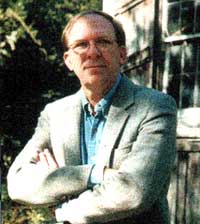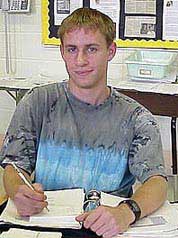Major Works
- When Autumn Comes: Wordscapes by David Hutto (CD album) (2000)
- Close Your Eyes (1999)
- The Whisper (1999)
- Prayer From The Stone (1998)
- The Loft (1998)
- By The Ferns (1998)
- Beneath My Branches, (1998)
- The Rocker (1998)
- The Piper’s Trail (1998)
- Sanctuary (1998)
- When Autumn Comes (1997)
David N. Hutto, Jr.: A Biography
by Jeff Rudis (SHS)
David N. Hutto was born in 1944 in Lawranceville, Alabama. His father was a Methodist chaplain in the Military. In 1955 his father accepted a missionary opportunity at Camp Semitonga (founded in 1950), which was a very rural area in Alabama, where Hutto grew up (interview). Hutto was greatly influenced by the events of the 1960’s. Of this period he wrote, “I shall never forget peering out a window from a 6th Street building in Birmingham and watching black people being sprayed with fire hoses. Nor shall I forget the night Birmingham burned with fear, hatred, and violence. Nor shall I forget the night I received a call telling me that my home had been burned to the ground, leaving my parents with only the clothes on their back” (Artist’s statement).
Hutto obtained a B.A. at Birmingham Southern College and went on to obtain an M. A. at the University of Alabama in Tuscaloosa (Hutto resume). Hutto married a Melanie Duffey in April of 1968 (interview). Hutto says of her, “One April I married a wonderful woman who saw more in me than I’ve ever seen in myself. She has made me better in every way as a friend, wife, and confidant.” (Artist’s statement)
Newly married, the two moved to Fayetteville, North Carolina, where Hutto was the Instructor of Sculpture and Design at Methodist University. In 1969, the two moved to Radford, Virginia, where Hutto was the Instructor of Art History & Design at Radford University (resume). In 1971, Hutto returned to Alabama to accept the position of Director of Advertising Production at Agricultural Advertising Inc., part of the Alabama Farm Bureau, in Montgomery (resume). There they started a family, with their son Jason being born in 1972, and Ken being born in 1974 (interview).
In 1975, Hutto moved to Starkville, Mississippi, accepting a job in advertising with Mississippi State University’s Cooperative Extension Service. This job provided the path for Hutto’s current job as Director of the University Television Center and WMSV Radio, which he has held from 1988 to 2000.
Hutto has always enjoyed writing but never pursued anything in particular until around 1996, when his mother was in her 80’s, and her health started to decline. While in Maine at a conference, he decided to take a walk in a city park. It was autumn, and he began to reflect upon his childhood. Words began to flow, and he pulled out a pen and paper and began to write. The result of this was his first poem When Autumn Comes (interview). Hutto states, “A beautiful fall called attention to the time in life when all of us pause and reflect on things we have accomplished in a lifetime and on what the next steps might be. My mother was then in her 80’s, the autumn of her years, and this provided additional inspiration.” (Clarion Ledger)
Hutto’s success began after he followed his friends’ advice, and he submitted his work to the National Public Radio’s director in winter of 1996. Not hearing back from them in over a month, Hutto said, “Ah, just forget it,” and pushed the poem out of his mind (interview). Then in fall of 1997, he received a call, learning that the director had decided to finally air his poem. The response was overwhelming and inspired him to continue writing poems (Clarion Ledger).
Not satisfied with mere words on paper, Hutto wanted to turn his poem into a full experience of the senses, to better evoke the feelings he felt when writing it within the listener. So, he talked to some of his friends. The poem was well received, and a musician offered to compose an original soundtrack for the poem (interview). Betty Brewer, a seventy-three year-old retired Broadway performer, was chosen to narrate the poem When Autumn Comes . “Though in failing health, Brewer took a keen interest in the project,” Hutto said. “Sadly, Mrs. Brewer died within three weeks of finishing her work.” (Clarion Ledger) Hutto coined the poetic medium of his final work a “wordscape”—a landscape painted by words (interview). Altogether the Wordscape When Autumn Comes contains ten poems written by David Hutto. Actor John Maxwell reads two poems in the collection. Other poems are read by Hutto himself and Starkville resident Elizabeth Gwin, among others.
Hutto’s poems “come” to him at odd places—heeven showed me some church offering envelopes with writing all over them. He says that inspiration has struck him everywhere, from walks on the beach, to long drives in his car. However, he says he has never had a poem come to him in Starkville. “I don’t know why, it just doesn’t happen,” he said with a chuckle (interview). Hutto went on to write nine additional poems in his “wordscape” style, and this led to the release of his debut compact disc When Autumn Comes—Wordscapes by David N. Hutto in 1999.
His CD by can be found at Bebop Record Shop in Starkville and at the MSU Bookstore (2000).
UPDATE 2015
After working and living in Starkville, Mississippi, for twenty-five years, David Hutto is currently the Dean for Technology and Development at Blue Ridge Community College in Flat Rock, North Carolina where he is responsible for telecommunications, data operations, distance learning and instructional technology, public information, institutional planning, research, development, and institutional effectiveness.
Reviews
A Review of When Autumn Comes
by Jeff Rudis (SHS)
A truly unique and original work of art, I first listened to When Autumn Comes during my interview with David Hutto, and the poem sent chills along my spine. This poem is a reflection of the poet’s inner thoughts and reflections regarding life’s journey. The poem starts out on a dark, chilly note, as the narrator speaks of the chill of autumn piercing her soul, even though her shawl is tight and cloak heavy, and yet retains an aura of hope and warmth, as the narrator speaks of the loon’s cry of love, and the trees swaying, speaking into the breeze. The poem ends in a shroud of mystery, in the narrator’s reference to the mist hanging over the pond.
Words alone cannot do this exquisite work of art justice, as Hutto reasoned. That is why he turned this work into a wordscape — you must close your eyes and allow the words to wash over you, hearing the haunting piano notes, the birds in the background, the breeze rustling through the trees, to experience it.
Related Websites
- MSU writer/administrator produces ‘wordscapes’ disc. Mississippi State University, Maridith Geuder, 2000
- David Hutto’s LinkedIn Profile
Bibliography
- “NPR Stint Leads to MSU Staffer’s Production of Wordscape CD.” Clarion Ledger
- “Voices From Mapleridge – Artist’s Statement.” Online
- “Poem leads to ‘wordscape’ disc.” MSU Memo
- “Voices From Mapleridge – Poetry.” Online
- Personal Interview with David N. Hutto (May/01/2000).
- “David N. Hutto – Resume.” Online 2000



